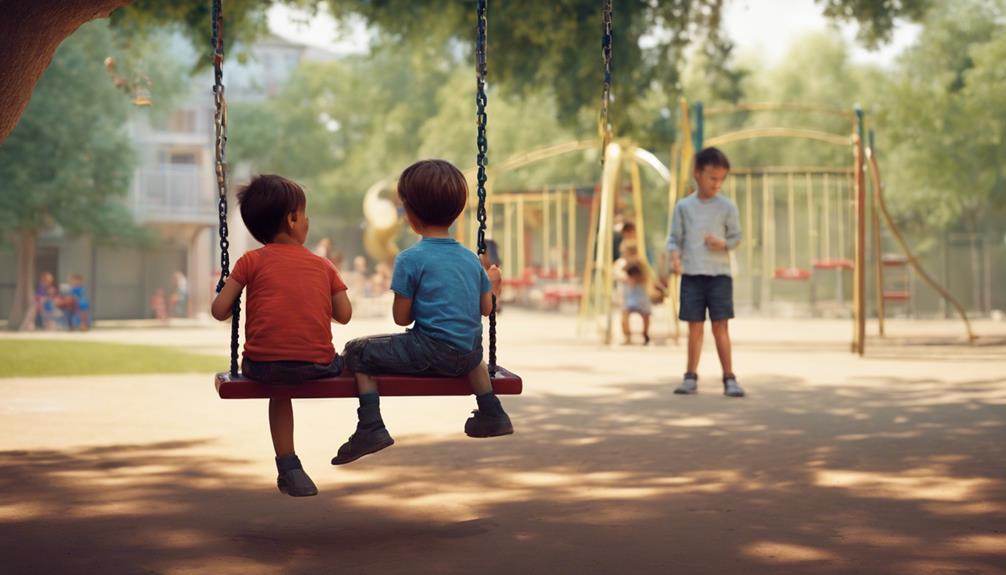Imagine this scenario: You have just announced your upcoming divorce, and suddenly your adult child reacts with a mix of anger and confusion.
How do you navigate this complex emotional terrain with grace and understanding?
Well, let's explore essential tips for handling divorce with adult children, from managing their expectations to fostering healthy communication channels.
It's a delicate process, but with the right strategies, we can help our adult children navigate this challenging time with resilience and strength.
Key Takeaways
- Acknowledge adult children's emotional challenges and provide support
- Prioritize open and honest communication to build trust and understanding
- Respect individual boundaries to avoid conflicts and promote harmony
- Navigate changes in family dynamics with empathy and flexibility
Understanding Adult Children's Perspectives
In understanding adult children's perspectives on divorce, we must acknowledge the emotional challenges they often face, such as feelings of loss, guilt, and uncertainty about their own relationships. Adult children cope with loyalty conflicts, role reversals, and a general unease when parents disparage each other post-divorce. It's crucial to provide them with support and reassurance during this tumultuous time. Setting boundaries and respecting their emotional well-being are key to aiding in their post-divorce adjustment.
As adult children navigate the complexities of their parents' divorce, they may find themselves in uncharted territory, grappling with conflicting emotions and newfound responsibilities. Offering them a safe space to express their feelings and concerns can help alleviate some of the burdens they carry. By acknowledging their struggles and validating their experiences, we can empower them to prioritize their emotional health. Remember, providing unwavering support and reassurance can make a world of difference in their journey towards healing and understanding. Together, we can navigate these challenges with empathy and grace.
Prioritizing Open and Honest Communication

To foster stronger bonds and mutual understanding during and after divorce, prioritizing open and honest communication with adult children is essential. Open communication lays the groundwork for trust and respect, ensuring adult children feel included and valued in the decision-making process. By openly discussing emotions and decisions, parents can alleviate their children's concerns and anxieties, fostering a sense of understanding and solidarity. Transparent conversations help prevent misunderstandings and create a supportive environment for adult children to navigate the complexities of divorce.
| Benefits of Prioritizing Communication |
|---|
| Builds trust and understanding |
| Fosters respect and inclusion |
| Eases concerns and anxieties |
Effective communication post-divorce is key to maintaining healthy relationships with adult children. By being transparent and open, parents can bridge gaps, address emotions, and work together towards a harmonious future.
Supporting Emotional Well-Being
Navigating the emotional impact of divorce on adult children requires a sensitive and proactive approach to ensure their well-being remains a top priority. As adult children grapple with the divorce impact, it's crucial to provide the necessary support for their emotional well-being. Here are some essential tips to help adult children navigate their feelings during this challenging time:
- Acknowledging Feelings: Encourage adult children to express emotions such as guilt, anger, and sadness openly and assure them that it's normal to feel this way.
- Building Support Systems: Help adult children establish new support networks to cope with the changes in their lives, both emotionally and financially.
- Creating a Safe Space: Offer a safe and non-judgmental environment where adult children can freely share their thoughts and feelings without fear of criticism.
- Reassuring Responsibility: Remind adult children that they aren't to blame for the divorce, alleviating any feelings of guilt or unwarranted responsibility.
Respecting Individual Boundaries

Respecting the autonomy and emotional needs of adult children during divorce is essential for fostering healthier parent-child relationships post-separation. Acknowledging and respecting the boundaries set by adult children can greatly contribute to maintaining mutual respect and open communication during this challenging time. By understanding and accepting their need for independence, parents can show genuine concern for their emotional well-being.
Setting clear boundaries not only helps in avoiding emotional conflicts but also promotes a more harmonious relationship dynamic. It's crucial to recognize that each individual may have different needs and ways of coping with the divorce process. By honoring these boundaries, parents demonstrate their willingness to support their adult children through this difficult period.
Respecting adult children's boundaries is a sign of maturity and empathy, showing that their feelings and independence are valued. This approach can pave the way for stronger parent-child relationships built on trust, understanding, and open communication.
Navigating Changes in Family Dynamics
Understanding the emotional responses of our adult children after a gray divorce is crucial as we navigate the changes in our family dynamics. It's essential to acknowledge that adult children may struggle with altered roles and responsibilities within the family unit post-divorce. Adjusting to new family structures and dynamics can be challenging for them, impacting their emotions and perspectives.
To effectively navigate these changes, open communication and flexibility play a vital role. By fostering an environment where adult children feel heard and supported, we can help them navigate the shifting family dynamics with greater ease. Additionally, taking the time to understand their viewpoints and emotions is key to building stronger relationships and fostering a sense of unity during this transition.
By approaching these changes with empathy and a willingness to adapt, we can help our adult children navigate this period of transformation with grace and understanding.
- Acknowledge and validate their emotions
- Encourage open communication and dialogue
- Be flexible in adjusting to new family roles
- Seek to understand their perspectives and viewpoints
Frequently Asked Questions
How Do You Deal With Adult Children During Divorce?
We acknowledge adult children's emotions during divorce. We provide a safe space for them to share. We avoid burdening them with our emotional needs. We communicate openly, reassuring them it's not their fault. We respect their boundaries and choices.
What Age Is Most Affected by a Parents Divorce?
In their 20s and 30s, adult children can be deeply impacted by their parents' divorce. This crucial period shapes their views on relationships. Emotional struggles may linger, affecting their own beliefs and dynamics.
What Is the First Thing to Do When Separating?
First things first when separating: focus on open communication. We must prioritize honesty and understanding. This sets the foundation for a smoother transition. Let's tackle this head-on together with compassion and respect.
What Not to Say to Kids During Divorce?
We should avoid saying negative things about the other parent during divorce. It can unsettle adult children. Refrain from discussing intimate details or conflicts with the other parent. Be mindful of not involving them in marital disputes for their emotional well-being.
Conclusion
As we navigate divorce with adult children, it's crucial to understand that 28% of adult children feel a sense of guilt or responsibility for their parents' divorce.
This statistic highlights the importance of open communication, supporting emotional well-being, and respecting individual boundaries throughout the process.
By prioritizing these aspects, we can foster stronger relationships with our adult children and help them navigate this challenging transition with empathy and understanding.










